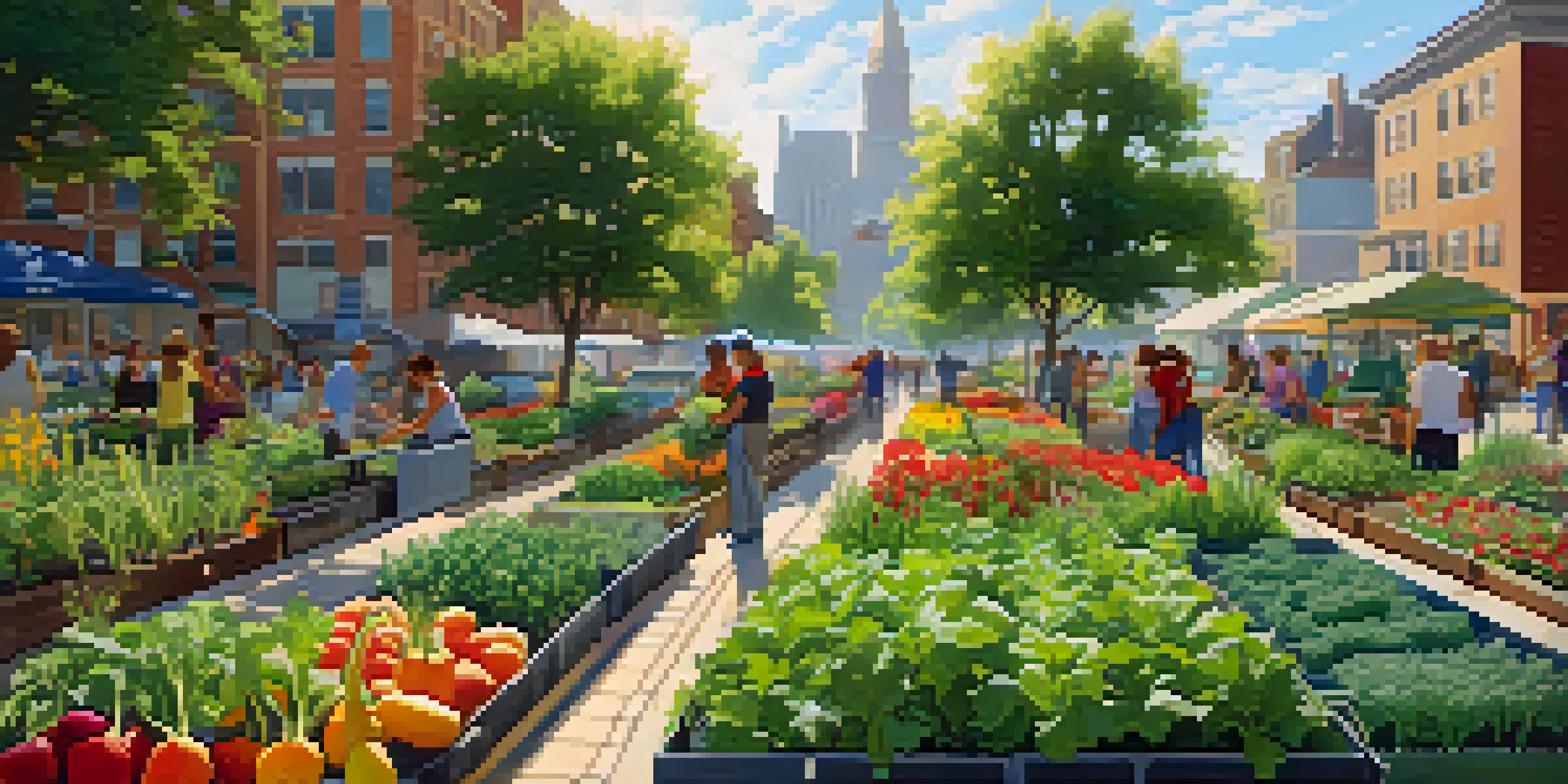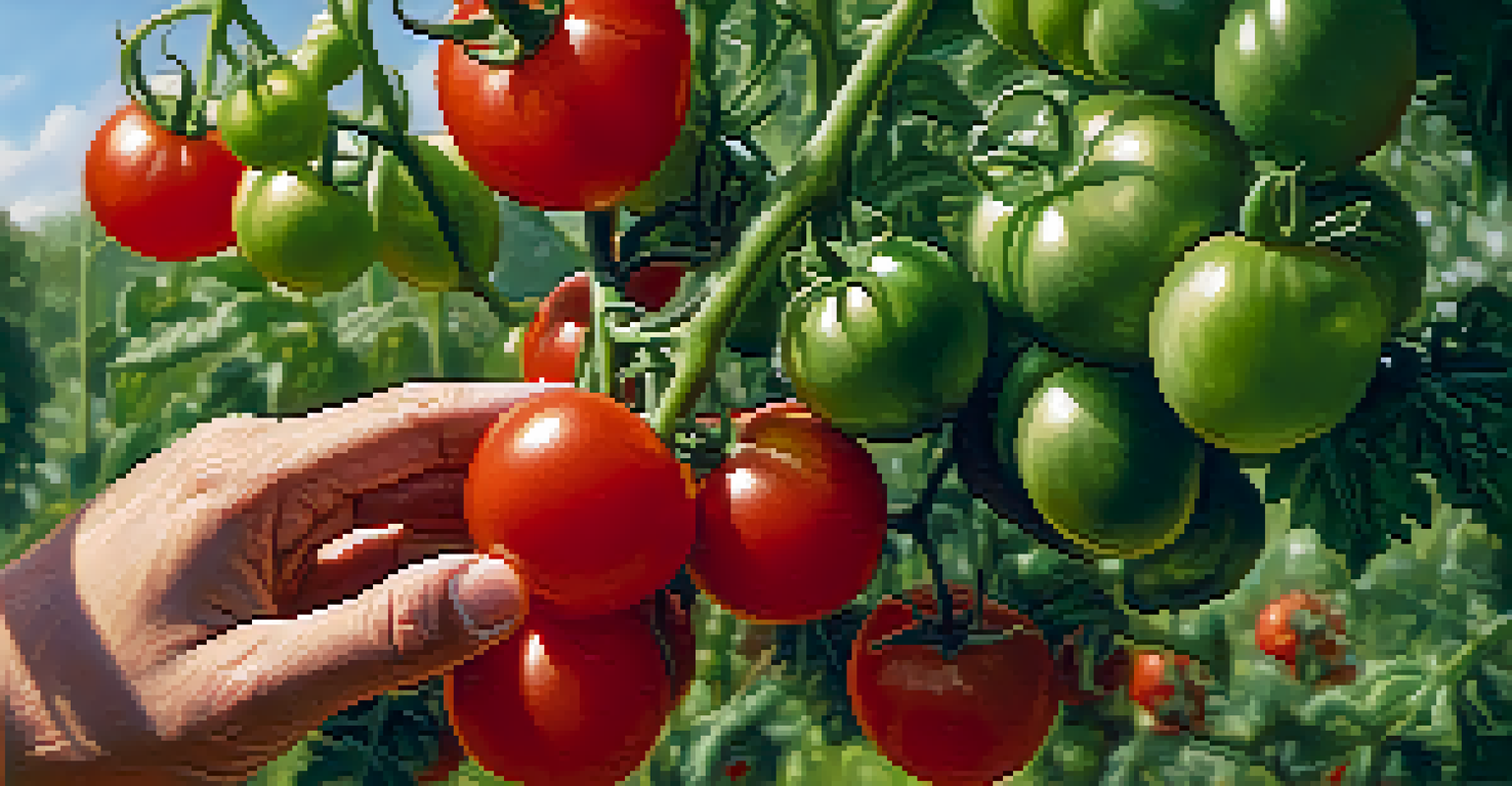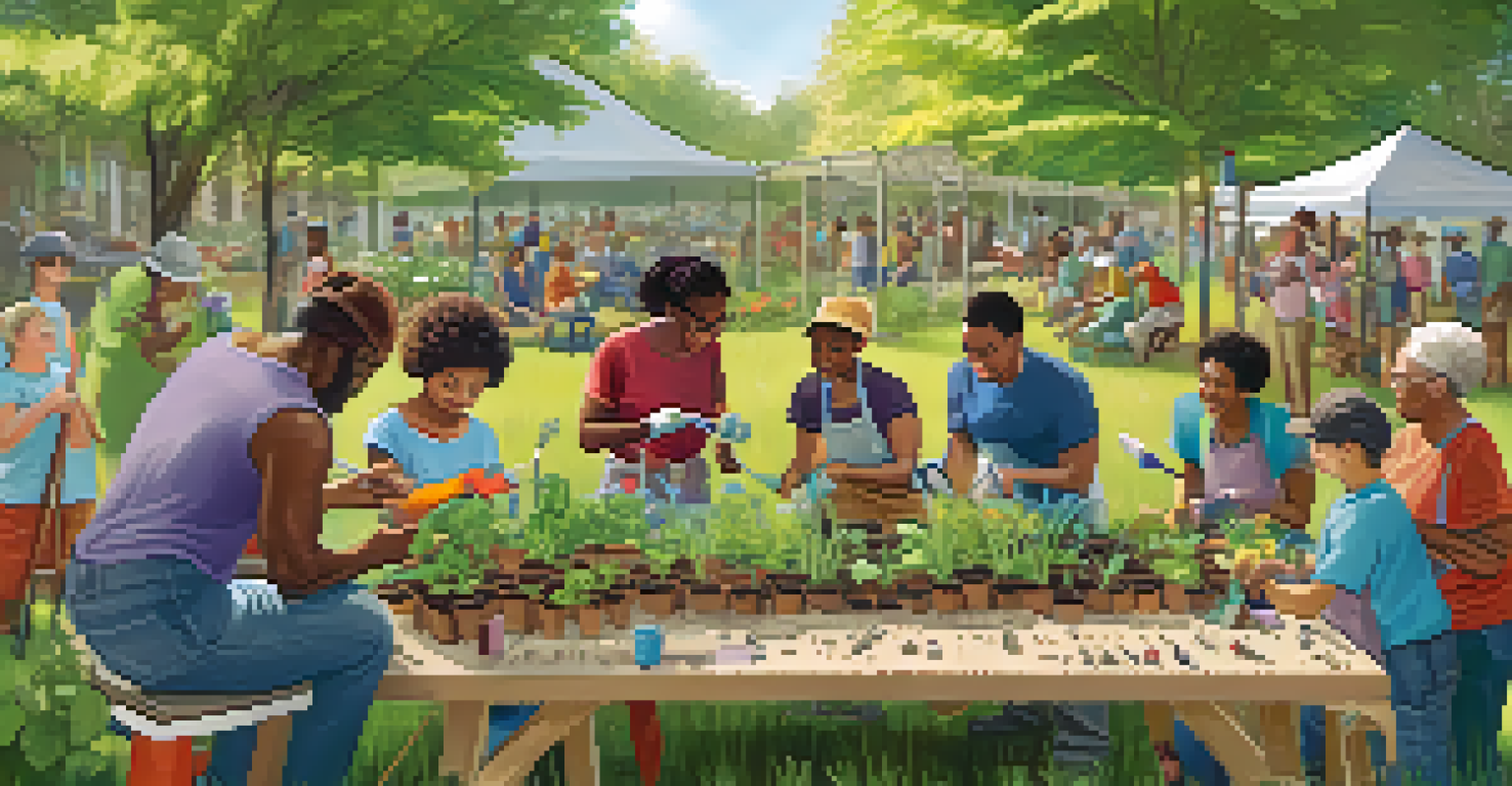Exploring Community Gardening Benefits for Urban Residents

Community Gardening: A Growing Trend in Urban Areas
In recent years, community gardening has sprouted as a popular trend in urban settings. These shared spaces allow residents to cultivate their own plants, whether flowers, herbs, or vegetables, right in their neighborhoods. The movement not only beautifies cities but also promotes sustainability and healthy living.
To plant a garden is to believe in tomorrow.
Urban areas often lack green spaces, making community gardens a breath of fresh air for city dwellers. These gardens transform vacant lots or underused spaces into vibrant hubs of activity and growth. They serve as a reminder that nature can thrive even amidst concrete and steel.
As more people seek to reconnect with nature, community gardens provide the perfect platform. They encourage collaboration among residents and foster a shared sense of responsibility for the environment. This trend highlights the importance of green initiatives in urban planning.
Health Benefits: Fresh Produce at Your Fingertips
One of the most significant benefits of community gardening is access to fresh produce. Urban residents often struggle to find affordable, healthy food options, but growing your own vegetables can bridge that gap. Gardening not only encourages healthier eating habits but also reduces reliance on processed foods.

Eating fresh fruits and vegetables is key to maintaining a balanced diet. When residents grow their own food, they gain a deeper understanding of nutrition and food sources. Plus, nothing beats the taste of a ripe tomato picked straight from the vine!
Community Gardens Boost Urban Life
These shared green spaces enhance city living by promoting sustainability, health, and social connections.
Additionally, engaging in gardening activities can lead to improved physical health. Digging, planting, and weeding provide a great workout, helping to combat sedentary lifestyles. This hands-on approach to health promotes both physical fitness and mental well-being.
Social Connections: Building Community Ties
Community gardens are more than just places to grow food; they are social hubs where friendships blossom. Gardeners often work side by side, fostering a sense of camaraderie as they share tips, tools, and stories. This interaction creates bonds that strengthen the community fabric.
Gardening adds years to your life and life to your years.
Diversity thrives in community gardens, bringing together individuals from various backgrounds. These shared spaces encourage cultural exchange, allowing participants to learn from each other's gardening techniques and traditions. It's a beautiful way to celebrate diversity while working towards a common goal.
Participating in a community garden also instills a sense of belonging. Residents feel more connected to their neighborhood and each other, ultimately leading to a more cohesive community. This social aspect is vital in urban environments where isolation can be common.
Environmental Impact: Greening Our Urban Spaces
Community gardening plays a crucial role in improving urban environments. By increasing green spaces, these gardens help combat air pollution and reduce the urban heat island effect. The more greenery we introduce into our cities, the healthier our air quality becomes.
Gardens also promote biodiversity, providing habitats for various species, including pollinators like bees and butterflies. This is essential for maintaining balanced ecosystems in urban areas. As gardeners nurture their plants, they inadvertently contribute to the protection of local wildlife.
Fresh Produce Enhances Well-Being
Access to homegrown fruits and vegetables encourages healthier eating habits and physical activity.
Furthermore, community gardens encourage sustainable practices such as composting and organic gardening. By adopting these methods, urban residents become more aware of their environmental impact and can make conscious choices that benefit the planet. It's a win-win for both people and the Earth.
Educational Opportunities: Learning Through Gardening
Community gardens serve as outdoor classrooms for people of all ages. They provide hands-on learning experiences about horticulture, ecology, and nutrition. This educational aspect can inspire a new generation of environmentally conscious individuals.
Workshops and community events often take place in these gardens, allowing participants to learn new skills. From composting to seed saving, the knowledge shared in community gardens is invaluable. It's a practical way to foster a love for nature and gardening.
Moreover, schools often partner with local gardens to provide students with experiential learning opportunities. These initiatives can cultivate a sense of responsibility and stewardship toward the environment in young minds. Gardening becomes a tool for lifelong learning.
Mental Health Benefits: Finding Peace in the Garden
Gardening is known to have therapeutic effects on mental health. Spending time in nature can reduce stress, anxiety, and depression, making community gardens a vital resource for urban residents. The act of gardening itself can be meditative, allowing individuals to focus on the present moment.
Connecting with the earth and nurturing plants provides a sense of purpose and accomplishment. This can significantly boost self-esteem and enhance overall well-being. It's amazing how a few hours in the garden can elevate one's mood and outlook on life.
Gardening Fosters Community Bonds
Community gardens create opportunities for social interaction, cultural exchange, and a sense of belonging.
Additionally, the social nature of community gardens fosters emotional support among participants. Sharing experiences and challenges related to gardening can create a supportive network that contributes to mental wellness. It’s a simple yet powerful way to combat urban loneliness.
Getting Involved: How to Start Your Gardening Journey
If you're inspired to join the community gardening movement, getting started is easier than you think! Begin by researching local gardens in your area; many welcome new members and offer plots for rent or shared spaces. Connecting with your neighbors can also lead to informal gardening groups.
Consider attending workshops or community events to learn more about gardening. These opportunities not only enhance your skills but also introduce you to like-minded individuals who share your passion for growing. The gardening community is often supportive and eager to help newcomers.

Lastly, remember that gardening is a journey, and it's okay to start small. Whether you have a tiny balcony or a spacious backyard, every effort counts. Embrace the process, enjoy the rewards, and watch your urban oasis flourish!